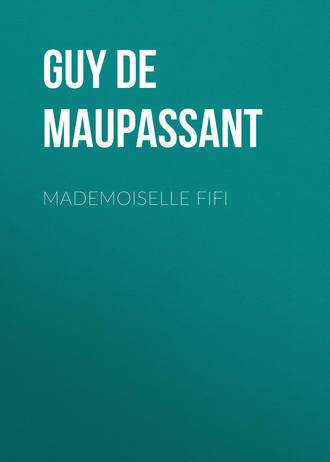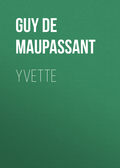
Ги де Мопассан
Mademoiselle Fifi
The door closed suddenly. All the noise ceased. The frozen passengers stopped talking: they stood motionless and stiff.
An uninterrupted curtain of white, glistening flakes ceaselessly fell on the ground; it obliterated the forms of things and powdered them with an icy foam; and in the great silence of the quiet City, buried under the winter, one could hear nothing save that vague, nameless rustle of the falling snow – a sensation rather than a sound – an intermingling of light atoms which seemed to fill the space and cover the whole world.
The man reappeared with his lantern, leading by a rope a sad-looking horse who followed him reluctantly. He placed him against the shaft, fastened the straps, turned around for a long time to make sure that the harness was properly fixed, for he could use only one hand, the other holding the lantern. As he was going to bring the second animal, he noticed that all the travelers were standing still, already white with snow, and he told them: – "Why don't you get in the coach? there you would be under shelter at least."
No doubt this had not occurred to them; at once there was a rush to get in. The three men installed their wives in the rear of the coach and then got in themselves; one after the other, the remaining indistinct and snow covered forms took the last seats without exchanging a single word.
The floor was covered with straw into which the feet sank. The ladies in the rear, having brought with them small copper foot-warmers, heated by means of a chemical coal, lighted these apparatuses, and for some time, in a low voice, they enumerated their advantages, repeating to each other things which they had not known for a long time.
At last six horses instead of four having been harnessed to the coach, on account of the difficult roads and heavier draft, a voice from the outside asked: "Is everybody in?" – To which a voice replied from the inside: – "Yes" – And the coach started.
The coach proceeded slowly, slowly, at a snail's pace. The wheels sank into the snow; the entire body of the carriage groaned with creaks; the animals were slipping, puffing, steaming, and the driver's gigantic whip was cracking continuously, flying in every direction, coiling up and unrolling itself like a thin snake, and suddenly lashing some rounded back, which then stretched out under a more violent effort.
Imperceptibly the day was breaking. Those light flakes that a traveler, a pure blood native of Rouen, had compared to a rain of cotton, had stopped falling. A murky light filtered through the big, dark and heavy clouds, which rendered more dazzling the whiteness of the country where one could see now a line of tall trees spangled with hoar frost, now a cottage with a snow hood.
Inside the coach, the travelers eyed each other inquisitively in the melancholy light of the dawn.
Way in the rear, on the best seats, facing each other, Mr. and Mrs. Loiseau, wholesale wine dealers of the Rue Grand-Pont, were slumbering.
Former clerk to a merchant who had been ruined in business, Loiseau had bought his employer's stock and made a fortune. He was selling very cheap very bad wine to small liquor dealers in the country, and was considered by his friends and acquaintances as a sharp crook, a real Norman full of wiles and joviality. His reputation as a crook was so well established that one evening at the Prefecture, Mr. Tournel, a writer of fables and songs, a biting and fine wit, a local literary glory, having proposed to the ladies' whom he saw rather drowsy, to play a game of "L'oiseau vole," (the bird steals – flies) the joke flew through the salons of the Prefect and from there, reaching those of the town, made all the jaws of the Province laugh for a whole month.
In addition to this unsavory reputation, Loiseau was famous for his various practical jokes, his good or bad tricks; and nobody could mention his name without adding immediately: – "Loiseau is merciless; he spares nobody!" —
Undersized, he had a balloon shaped stomach surmounted by a florid face between a pair of grayish whiskers.
His wife, tall, stout determined, with a loud voice, a woman of quick decision, represented order and arithmetic in the business house which her husband enlivened by his mirthful activity.
Beside them sat, more dignified and belonging to a superior class, Mr. Carré-Lamadon, a man of considerable standing, a leader in the cotton business, proprietor of three spinning mills, officer of the Legion of Honor and member of the General Council. During the Empire he had been the leader of the friendly opposition, solely for the purpose of commanding a higher price for his support when he rallied to the cause which he was fighting daily with courteous weapons, according to his own expression. Mrs. Carré-Lamadon, considerably younger than her husband, remained the consolation of Officers belonging to good families who had been quartered in Rouen.
She was sitting opposite her husband, pretty, slender, graceful, curled in her furs, and gazed mournfully at the lamentable interior of the coach.
Her neighbors, Count and Countess Hubert de Bréville, bore one of the most ancient and noble names of Normandy. the Count, an old nobleman of aristocratic bearing, endeavored to accentuate by the artifices of his toilette his natural resemblance to King Henry IV, who, according to a legend, in which the family gloried, had caused the maternity of a de Bréville lady whose husband, on account of his royal connection, had been made a Count and Governor of a Province.
A Colleague of Carré-Lamadon in the General Council, Count Hubert represented the Orleanist party in his Department. The story of his marriage with the daughter of a small ship-owner of Nantes had always remained mysterious. But as the Countess had a grand air, entertained better than any other hostess, and was credited with having been the Dulcinea of one of Louis Philippe's sons, the whole nobility showed her the greatest consideration, and her salon remained the most exclusive in the locality, the only one where old gallantry was conserved and admission to which was not easy.
The wealth of the de Brévilles, all invested in real estate, was estimated to yield an annual income of five hundred thousand francs.
These six persons occupied the rear of the coach, the side of wealthy, serene and solid Society, authoritative, honest people who have religion and principles.
By a strange hazard, all the women were seated on the same side; and the Countess further had for neighbors two saintly nuns who fingered long rosaries and mumbled Paters and Aves. One of them was old and had a face so deeply pitted with smallpox, that she looked as if she had been shot full in the face by a rapid-firing gun. The other, very frail, had a pretty and sickly head on a narrow consumptive chest eaten up by that devouring faith which makes martyrs and visionaries. Seated opposite the nuns, a man and a woman attracted the eyes of all the other passengers.
The man, a well known character, was Cornudet the democrat, the terror of respectable people. Since twenty years he had been dipping his large red beard in the bocks of all the democratic Cafés. He had spent, with the help of his brethren and friends, a good sized fortune inherited from his father, a retired Confectioner, and he was impatiently waiting for the advent of the Republic to secure a political position deserved by so many revolutionary libations. On the fourth of September, possibly as a result of a practical joke, he had thought that he had been appointed Prefect, but when he wanted to take up his duties, the clerk, who had remained in charge of the office, refused to recognize him, which compelled him to retire. A very good natured chap, and moreover inoffensive and serviable, he had worked with an incomparable energy to organize the defense of the City. He had had trenches dug in the plains, all the young trees in the neighboring forests cut down, traps set on all the roads, and at the approach of the enemy, satisfied with his preparations, he had hurriedly returned to town. He thought now that he would be more useful in Havre where new trenches were going to be needed.
The woman, one of those called gallant, was famous for her precocious embonpoint which had earned her the nickname of "Boule de Suif" (ball of tallow). Short and rotund all over, fat enough to supply lard, with puffed fingers constricted at the joints and looking like strings of small sausages, a shiny and tight skin, an enormous bust which protruded from under her gown, she was yet attractive and much coveted, her fresh appearance being pleasant to look at. Her face was like a red apple, a peony bud, ready to bloom forth; and in the upper part of her face, two magnificent black eyes, shaded by large thick lashes which cast a shadow into them; in the lower part, a charming mouth, narrow, moist, ripe for kisses, and furnished with white and microscopic teeth.
Moreover she was said to be full of invaluable qualities.
As soon as she was recognized, whispers circulated among the respectable women and the words: "hussy", "public scandal" were spoken so loud that she raised her head. Then she turned on her neighbors such a challenging and haughty look, that a great silence fell on the company and they all lowered their eyes except Loiseau, who kept on watching her with an exhilarated air.
But soon the conversation was resumed between the three ladies, whom the presence of this girl had suddenly made friends, almost intimates. It seemed to them that they should form a sort of "fasces" of their conjugal dignities in the presence of this shameless mercenary; for legalized love always looks down on its free brother.
The three men, also drawn closer by an instinct of conservation at the sight of Cornudet, spoke of money matters with an expression of contempt for the poor. Count Hubert related the damage done to his property by the Prussians, the losses that would result from their stealing of a tenfold millionaire grand Seigneur whom such reverses would hardly incommodate for one year. Mr. Carré-Lamadon, who had suffered serious losses in his cotton business, had taken the precaution of sending six hundred thousand francs to England, a provision for rainy days which would enable him to meet emergencies. As to Loiseau, he had found a way of selling to the French Quartermaster's Office all the low grade wines he had in stock, so that the Government owed him a tremendous sum, which he expected to cash in time at Havre.
And all three cast at each other quick and friendly glances. Although belonging to different social sets, they felt united in the brotherhood of money, the great freemasonry of those who possess, who jingle gold when they put their hands in the pockets of their trousers.
The coach was making such slow headway that at ten o'clock A. M. they had traveled only four leagues. The men got off three times and walked up the hills. They began to feel uneasy, because they expected to have luncheon in Tôtes and now there was hardly any possibility of getting there before night. Each was watching to find an inn on the road, when the coach foundered in a snow-drift, and it took two hours to extricate it.
Appetites grew and spirits fell; no road-house, no wine dealer could be discovered, the approach of the Prussians and the passage of the starving French troops having frightened away all the trades-people.
The men went to the farmhouses by the roadside to look for food but they did not even find bread, for the suspicious peasants had hidden away their reserve of provisions for fear of being pillaged by the soldiers who, having nothing to eat, were taking forcibly what they discovered.
Toward one o'clock in the afternoon Loiseau announced that positively he felt a big hollow in his stomach. All of them had been suffering like him for a long time, and the violent craving for food, growing steadily had killed off the conversations.
From time to time one of them yawned, another imitated him instantly; and each, in turn, according to his character, manners and social position, opened his mouth noisily or modestly holding his hand before the gaping hole from which breath steamed out.
Boule de Suif stooped several times as if looking for something under her petticoats. She hesitated a second, looked at her neighbors and the straightened herself up quietly. Faces were pale and drawn. Loiseau said that he would pay one thousand francs for a knuckle of ham. His wife made a gesture as if to protest, then she became calm. She always suffered when she heard of money being squandered, and did not even understand jokes on that subject. "As a matter of fact, I don't feel well, said the Count; why did I not think of taking provisions with me?" – Every one was reproaching himself with the same omission.
Cornudet, however, had a pocket bottle of rum; he offered some to his companions; they refused coldly. Loiseau alone accepted a few drops, and when he returned the bottle, he thanked: "It is good, all the same! it warms you up and it cheats the appetite." – The drink put him in good humor and he proposed that they should do as on the small boat in the song: "eat the fattest of the passengers." This indirect allusion to Boule de Suif shocked the well-bred passengers. There was no response. Cornudet alone smiled. The two good Sisters had ceased to mumble their rosary, and with their hands thrust down in their wide sleeves, they held themselves motionless, obstinately lowering their eyes and doubtless offering up as a sacrifice to God the suffering He had sent them.
At last, at three o'clock, as they were still in the middle of an interminable plain, without any village in sight, Boule de Suif bent down quickly and from under her seat pulled out a large basket covered with a white napkin.
She drew out first a small earthen plate, a fine silver drinking cup, then a large pot in which two whole chickens, carved in pieces, had stewed in their own gravy; and one could further see in the basket other good things wrapped up, pastry, fruit, delicacies, provisions prepared for a three days' trip, so that the traveler would not have to touch the food in the inns. The neck of four bottles emerged from among the food packages. She took the wing of a chicken and, began to eat it delicately with one of those small rolls which in Normandy are called "Régence."
All the eyes were attracted in her direction. Then the appetizing smell filled the coach, making the nostrils dilate and mouths water, while the jaws under the ears contracted painfully. The contempt of the ladies for this girl was becoming ferocious, developing into a desire to kill her or throw her, with her drinking cup, her basket and her provisions, out of the coach on the snow.
All the while, Loiseau had been devouring with his eyes the pot of chicken. He said: – "Well, well, the lady has been more provident than all of us! There are persons who always manage to think of everything." – She raised her head towards him: – "Would you like some, Sir?" "It is hard to fast since morning – " And looking around him he added: – "In moments like this, one is glad to find obliging people."
He had a newspaper which he unfolded on his knees in order not to soil his trousers, and with the point of a knife, which he always carried in his pocket, he picked a leg thoroughly varnished with jelly, bit it off and chewed it with such evident relish, that there arose in the coach a heavy sigh of distress.
Boule de Suif, with a humble and gentle voice, proposed to the good Sisters to share her luncheon. They both accepted instantly and, without raising their eyes, began to eat very fast, after having muttered a few words of thanks. Neither did Cornudet decline the offer of his neighbor, and with the nuns, they improvised a sort of table by unfolding newspapers on their knees.
Mouths were opening and closing constantly, swallowing, chewing, gulping ferociously. Loiseau in his corner was very busy eating, and in a low voice was urging his wife to imitate him. She resisted for a long time, but, after a cramp, which ran through her stomach, she yielded. Then her husband, rounding his sentences, asked their "charming companion" whether she would allow him to offer a small piece to Madame Loiseau. She replied: – "Why, certainly, Sir!" – with an amiable smile, and held out the terrine. An embarrassment occurred when the first bottle of claret was opened: there was only one drinking cup. They passed it around after wiping it each time. Cornudet alone, no doubt in a spirit of gallantry, put his lips on the spot which was still moist from the lips of his neighbor.
Then, surrounded by people who were eating, suffocated by the emanations of the food, Count and Countess de Bréville, as well as Mr. and Mrs. Carré-Lamadon, were suffering from that torture which has perpetuated the name of Tantalus. All at once the manufacturer's young wife heaved a sigh which caused every one to turn and look at her; she was as white as the snow outside; her eyes closed, her head fell forward, and she fainted. Her husband, alarmed, was imploring everybody's help. All lost their heads, but the oldest of the two Nuns holding in her arm the head of the unconscious lady, slipped between her lips the drinking cup of Boule de Suif and made her swallow a few drops of wine. The pretty lady moved, opened her eyes, smiled and declared in a dying voice that she felt better. However, to prevent a recurrence of the fainting, the Nun obliged her to drink a full cup of claret, and she added: – "It is just hunger, and nothing else."
Then Boule de Suif, blushing and embarrassed, stammered, looking at the four passengers who had not yet broken their fast: – "Mon Dieu!, if I ventured to offer these ladies and gentlemen?" She stopped short, thinking she had hurt their feelings. Loiseau began to speak: "Well, by Jove! in cases like this, we are all brothers and sisters and must help each other. Come, ladies, no ceremony! accept what is offered; what the devil! do we even know whether we are going to find a house to shelter us during the night? At the rate at which we are traveling, we shall not be in Tôtes before to-morrow noon." They hesitated, none daring to assume the responsibility of saying "Yes."
But the Count settled the question. He turned to the intimidated fat girl and assuming his grand aristocratic tone, he said to her: – "We accept gratefully, Madame."
The first step only costs. Once the Rubicon crossed, they ate heartily. The basket was emptied. It still contained one paté de foie gras, one paté de mauvette, a piece of smoked ham, Crassane pears, a Pont-l'Evêque cheese, assorted petits-fours, and a cup full of pickled gherkins and onions, Boule de Suif, like all women, having a predilection for raw things.
One could not partake of the girl's provisions without speaking to her. Now then, they talked, first with some restraint, then, as she behaved very well, with more freedom. Mesdames de Bréville and Carré-Lamadon, who had great "savoir-faire," made themselves tactfully gracious. Specially the Countess showed that amiable condescension of great ladies whom no contact can sully, and she was charming. On the other hand, fat Madame Loiseau, who had the soul of a gendarme, remained distant, sullen, saying little but eating much.
Naturally they talked about the war. They told the horrible things done by the Prussians, the deeds of bravery of the French; and all these people, who were fleeing, paid homage to the courage of others. Personal experiences soon followed, and Boule de Suif, related with unaffected emotion, with that warmth of language often characteristic of girls of her class in expressing their natural feelings, how she had left Rouen: – "First I thought that I could stay," she said; "I had my house full of provisions, and I preferred to feed a few soldiers then expatriate myself and go God knows where. But when I saw them, the Prussians, it was too much for me, I could not stand it. They made my blood boil with rage; and I wept all day for very shame. Then some were billeted to my house; I flew at the throat of the first one who entered. And I would have fixed that one, if they had not pulled me away by the hair. After that, I had to hide. Finally I found an opportunity to go, I left, and here I am!"
She was warmly congratulated. She was rising in the esteem of her traveling companions, who had not shown themselves as fearless. And in listening to her, Cornudet had the approving and benevolent smile of an apostle, in the same way as a priest hears a devout person praise God, for long-bearded democrats have the monopoly of patriotism just as the men in cassocks have the monopoly of religion. He spoke, in his turn, with a dogmatic tone, with the declamatory emphasis learned from proclamations daily posted on the walls, and he winded up with a piece of eloquence in which he condemned masterfully that "scoundrel of Napoleon III."
But Boule de Suif became angry immediately because she was a partisan of the Bonapartes. She turned as red as a cherry and stuttering with indignation: – "I should have like to see you in his place, you and your friends! It would have been nice, oh yes! It is you who betrayed the poor man! If we were ruled by rascals like you, there would remain nothing else to do for us but leave France." – Impassive, Cornudet kept a superior and contemptuous smile, but one could feel that big words were impending, when the Count interposed and, not without some difficulty, calmed the exasperated girl by proclaiming authoritatively that all sincere opinions should be respected. However, the Countess and the wife of the Cotton manufacturer, who bore in their hearts the unreasoning hatred of all decent people for the Republic, and that predilection which all women have for the pomp of despotic Governments, felt irresistibly attracted toward this dignified prostitute whose opinions were very much like theirs.







